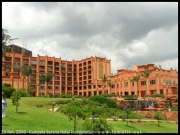The Monitor (Kampala)
News Article - Opinion Piece
Moses Byaruhanga - The writer is Special Presidential Assistant on Political Affairs
Uganda: H.H. the Aga Khan is a Blessing to Uganda
I had written about the Serena Hotel before but I have to return to it on a different note. This is one of the success stories of privatisation in Uganda. It's good it has finally happened.
In his speech, His Highness the Aga Khan said that 13 years ago their bid to take over the then Nile Hotel was not accepted. Looking at how the Aga Khan group has transformed the former Nile Hotel into one of the best hotels in Africa, one can imagine if this had been done 13 years ago when they first made attempts to take over Nile Hotel.
His Highness talked of completing a tourist circuit by setting up new safari lodges and resorts upcountry. Probably if the Aga Khan group had taken over the Nile 13 years ago, the circuit would be complete by now. Nonetheless it's never too late as the English say. The problem of the story of privatisation in Uganda has been an ideological one.
We had leaders at various levels who saw privatisation as a way of merely selling Ugandan companies -- the fact that most of them were loss-making notwithstanding.
We must thank His Highness for the patience. Having been denied to take over the Nile Hotel 13 years ago they had all the reason to give up but when an opportunity offered itself three years ago, they were still interested. See what they have done, a $30 million investment.
What our political and civil service class, who misunderstood privatisation, failed to grasp was that when you frustrate an investor, he is free to take his money elsewhere. Uganda is not the only investment destination in the world.
Political interference
You remember during the first attempt at privatising former Uganda Commercial Bank (UCB), the Citibank group had expressed interest. However, they wanted to buy the banking business and not the buildings and its other assets. They were not real estate developers to run buildings.
The political class (the 6th Parliament) could not hear of that. To them, UCB was the building at Kampala road. When the banking business could not be separated from the building, Citibank pulled out.
You may note that even those who finally redeemed UCB, Stanbic Bank they sold the building on Kampala road as it was not their duty as bankers to run buildings. Stanbic bank has since turned the bank around.
To those who argued against privatising UCB and cried that a peoples' bank was being sold can only gaze in amazement when they go to any Stanbic bank branch. Obviously things are much better.
The problem was people without business acumen deciding business policy. Like Serena, Stanbic Bank is one of the success stories of privatisation in Uganda.
On the one hand the two institutions show how the critics of privatisation were mistaken when they always pointed out Nile Hotel and UCB as failed ventures in the privatisation when the two suffered some problems along the way.
The two had failed as a result of the reason given above -- policymakers who knew nothing about what it takes to do business.
I don't want to bother you with what happened to Uganda Airlines when the 6th Parliament stood in the way of its privatisation. They wanted it to "remain Ugandan". Next time you are flying out book with Uganda Airlines! Safe journey.
While making comments at the Serena opening, President Museveni referred to His Highness the Aga Khan's speech at the same occasion as a must read. If you didn't attend the function I hope you read the speech in Sunday Vision yesterday. His Highness pointed out two things, which have hindered the development process in Africa, which I would want to share with you.
He said "our goal is not only merely to build an attractive building or to fill its rooms with visitors, but also to make a strategic investment which many private investors might be reluctant to make ...". Looking at the investment made in Serena of $30 milion there are not many Ugandans who can make that type of investment.
Huge investment
It is important to note that while many Ugandans have invested in various fields many of such investments are less than $5 million each. So the Aga Khan investments including those in the power sector and more to come are a symbol of salvation for our country.
We couldn't have had a better development partner in Uganda than His Highness the Aga Khan.
The other issue His Highness pointed out was that in the past development in Africa was constrained by political instability, currency fluctuations, lack of qualified manpower, and low rates of return. "But the biggest risk was often the fear that the projects would be too closely controlled by inexperienced governments and perhaps even nationalised at some point along the way".
How more spot on can one be in analysing the problems that have made Africa lag behind. In short, bad governance policies have be-devilled Africa.
The Movement leadership in its foresightedness solved most of the problems pointed out above by evolving bold policies like full repatriation of profits, liberalisation of foreign exchange market, return of Asian properties which was a confidence-building signal that the government respected private property, return of shares to the rightful owners in business which former leader A.M. Obote (RIP) had nationalised in 1969/70, and above all the policy of privatisation and liberalisation of the economy.
While His Highness talked about inexperienced governments, although that problem has been solved in Uganda, we still have uninformed public officials who delay private investors or who act and behave as if investors are a burden to Uganda.
